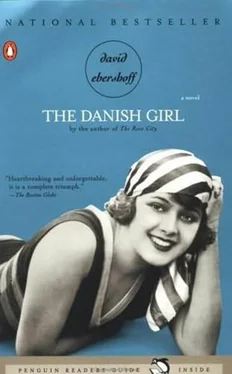From behind the hood of a Labourdette Skiff, Greta and Einar watched the moving men haul the shipping crates down the steps and into the cargo of their waiting lorry. Einar and Greta could smell the geraniums and the shipping straw, and the sweat of the men as they heaved the crate carrying Greta’s canopy bed. “My father’s leaving,” Greta said.
“Are you?”
“Oh, no. I’m going to stay on my own. Don’t you see?”
“See what?”
“At last I’m free.”
But Einar didn’t see, not just then. He didn’t see that Greta would need to be alone in Denmark, relationless in Europe, in order to become the woman she saw herself as. She needed to put an ocean and a continent between herself and her family in order to feel that at last she could breathe. What Einar didn’t understand then was that it was another of Greta’s brazenly American traits, that bubbling need to move away and reinvent. Never before had he imagined himself doing the same.
And this was another part of his life that the obituary written by Nationaltidende would miss. They wouldn’t know where to look for it. And like most newspapermen, the young reporters with the thinning hair wouldn’t be careful enough to check the source. Time was running out. Einar Wegener was slipping away. Only Greta would remember the life he had led.
The obituary that would never be written should have followed with this:
There was a day last summer when Lili woke up in her room in the casita and found herself unbearably hot. It was August. For the first time since they were married, Greta and Einar had decided not to holiday in Menton. Mostly because of his deteriorating health. The bleeding. The weight loss. The eyes sinking deeper into their sockets. And, sometimes, his inability to hold his head up at the table. No one knew what to do. No one knew what Einar wanted to be done. And Lili woke up on that hot morning, when the exhaust from the lorries delivering to the charcuterie on the corner was rising through the open window and dusting her face with grime. She was lying in her bed, wondering if she would rise at all today. And the morning passed, as she stared at the curled plaster in the ceiling, at the white petals in the center around the base of the chandelier.
Then she heard voices in the front room. A man, and a second. Hans and Carlisle. She listened to them talking to Greta, although Greta couldn’t be heard, so it was like hearing two men talk and talk. Their scratchy voices made Lili think of three-day growth on a throat. Lili must have fallen asleep, because the next thing she knew the sun was coming into the room from a different angle, now from over the green copper roofs across the street, where a hawk had built its nest, but Hans and Carlisle were still talking. And then they were at her door, and then inside the room, where Lili had thought more and more of installing a lock in the door but never came to doing so. She watched them enter, and it seemed more like a memory than something that was actually happening. They were saying, “Come on. Get up.” And then, “Little Lili.” She could feel them pull on her arms; again, the pull was more like memory than an actual tug. One of them brought a cup of milk to her mouth. A second pulled a dress over her head. They led her to the pickled-ash wardrobe to find a pair of shoes, and she stepped into a panel of sun and felt her skin ignite. And yet Hans and Carlisle sensed this, and so they found a parasol, a paper umbrella with bamboo ribs, and quickly opened it.
Somehow they got her to the Tuileries. And there they walked, Lili’s elbow linked with each of theirs. They moved beneath the poplars, in the swaying shadows that, to Lili, looked like large fish about to break the surface of the sea. Hans pulled up three green folding chairs, and they sat together in the afternoon as the children passed and the young lovers strolled and the lonely men with the quick eyes headed over to their side of the park, near L’Orangerie. Lili thought of the last time she was alone in the park; a few weeks earlier she had been out for a walk, and two little boys passed her, and one of them had said, “Lesbienne.” The boys were probably ten or eleven, blond with down on their cheeks, and their shorts showed most of their hairless thighs, and yet these pretty little boys had managed to hurl something so cruel, and wrong.
Lili sat with Hans and Carlisle, and she was hot in the dress they had chosen for her: one of the capped-sleeved dresses printed with conch shells that had come from the rented apartment in Menton. She knew then that her life with Einar was over. The only question that remained was whether she would have a life as Lili. Or would it all be over, and she would rest? Would Einar and Lili exit, hand in hand? Bones buried in the bog.
And Einar knew that his obituary would miss that as well. It would report everything about him except the life he had lived. And then the rhythm of the train’s speed slowed, and he opened his eyes and the porter called down the passageway: “Dresden! Dresden!”

Greta was sitting on the velvet ottoman. Her hair was falling in her face, and Edvard IV was in her lap, shaking. With Einar in Dresden, she suddenly felt incapable of settling down to work. She could think only of Einar in Germany, making his way to Professor Bolk’s laboratory. She had an image of Lili lost on a street, and Einar frightened on the professor’s examination table. Greta had wanted to travel with him, but he wouldn’t let her; he said this was something he had to do on his own. She couldn’t understand that. There was another train to Dresden only three hours after Einar’s, and she’d bought a ticket. She would turn up at the Municipal Women’s Clinic half a day after him, and there would be nothing Einar could do. Lili would want her there, Greta knew. But as she was packing her bags and making plans to leave Edvard IV with Anna, Greta stopped herself. Einar had asked her not to come: she heard his careful words over and over, the way they had caught in his throat.
Greta was older now. When she looked in the mirror there was a faint, handsome line on each side of her mouth, two lines that reminded her of the entrance to a cave-a bit of an exaggeration, she knew, but even so. She had promised herself she wouldn’t care about lines and wrinkles or even the few stray gray hairs that had grown into her temples like fur caught in a broom. But she did, although she had a hard time admitting it. Instead, she let it pick at her, as the months and the years passed and she settled more into her role as American artist abroad, while California receded farther and farther, as if the calamitous earthquake predicted by a doctor of physics on the palm-shaded campus of Cal Tech had already erupted on the Golden State and launched the whole coast into the Pacific; Pasadena slipping farther and farther away, a lost ship, a lost island, now only memory.
Except of course for Carlisle. During the autumn he had shuffled around Paris, the cuffs of his trousers muddying in the rain. The ache in his shin came and went with the clouds that rolled in off the Atlantic; and he and Lili would set out from the casita beneath their umbrellas, Lili wrapped up in her pink rubber coat that looked so heavy Greta worried she might collapse. Greta and Carlisle had had words about Einar’s choice of doctor. He told her plainly that he thought she was doing the wrong thing for Einar: “He could end up regretting this,” Carlisle had said, conceding. It stung her, this criticism, and she continued to feel its blow through the autumn as he changed the compress on Lili’s forehead, or as he sat on Lili’s bed playing poker with her, or as they bundled themselves up to head out for a night at the opera. “Sorry you can’t join us,” Lili would call with her small voice. “Don’t work too much!”
Читать дальше













